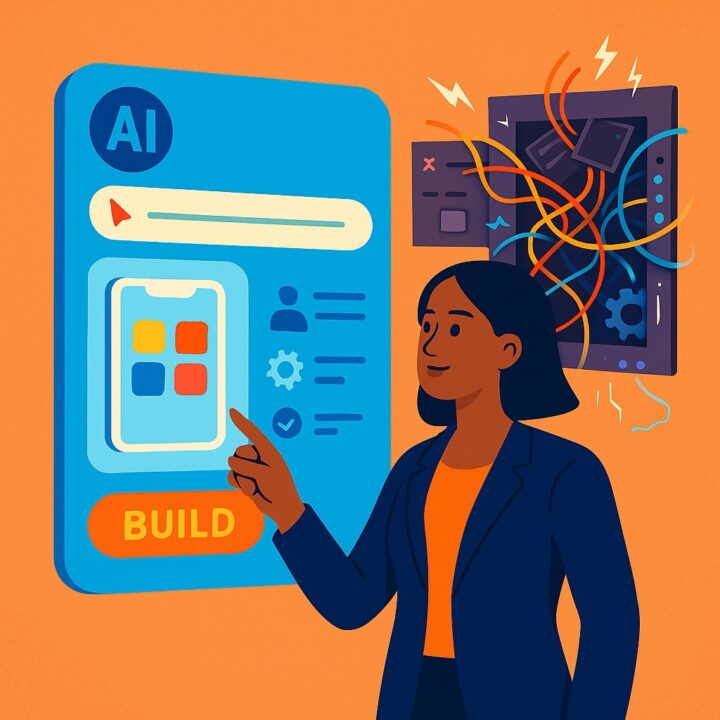Artificial Intelligence (AI) stands out as a transformative force for businesses in the rapidly evolving tech landscape. However, transitioning from AI experimentation to full-scale implementation is a complex journey that requires a meticulous approach to avoid common pitfalls. This blog highlights the critical importance of a well-thought-out testing and implementation plan for AI prototypes and projects.
The Human-Centric Approach to AI Implementation
Many businesses realize the potential of AI but are apprehensive about making the wrong investment or facing project failures. These fears are valid, given that analysts estimate over 50% of AI prototypes never make it to production, primarily due to misalignment with business value and inadequate planning. Here’s why having a robust testing and implementation plan is crucial:
Building Trust and Minimizing Fear
Stakeholder Engagement and Buy-in: At the heart of successful AI projects is the involvement of key stakeholders from the onset. Steadynamic’s AI Proof of Clear Path Workshop emphasizes this by engaging diverse teams from HR, sales, and legal to ensure a comprehensive understanding and support for the AI initiative. Visual prototypes serve as powerful communication tools that help stakeholders visualize the project, thus accelerating buy-in and ensuring alignment with business goals.
Addressing Job Security Concerns: One major fear among frontline employees is that AI might replace their jobs. A well-planned implementation process involves these employees in testing and feedback phases, converting them into advocates and AI process champions. This inclusive approach builds trust and reassures the workforce that AI is there to augment, not replace, their roles.
Structured and Disciplined Implementation
Defining Clear Objectives and KPIs: A key outcome of Steadynamic’s workshop is the establishment of Key Performance Indicators (KPIs) that align AI initiatives with strategic objectives. This structured approach ensures that AI projects have measurable outcomes that drive operational efficiency and business growth.
Rapid Prototyping and Feedback Iterations: Before full-scale implementation, the creation and refinement of rapid prototypes are essential. This iterative process allows for early detection of possible issues and alignment with desired outcomes, thereby reducing risks and increasing the likelihood of project success.
Comprehensive Testing and Rollout Strategy
Testing for Validity and Reliability: Ensuring the robustness of AI solutions through comprehensive testing is non-negotiable. This includes performance testing, system integration, and user acceptance testing. By validating these aspects through iterative prototyping, businesses can mitigate the risks of errors or failures during the deployment phase.
Feedback Collection and Adaptation: Testing is not a one-time activity but a continuous process. Collecting feedback from internal users during the prototype phase helps in fine-tuning the AI solution. This feedback is crucial for addressing any operational challenges and ensuring that the AI tool truly meets user needs and expectations.
Implementation Strategy and Support
User Training and Onboarding: A successful AI rollout hinges on the proficiency of its users. Comprehensive training plans and support systems are critical to equip internal teams with the necessary skills to effectively interact with AI tools. This reduces anxiety associated with new technologies and ensures a smoother transition.
Ongoing Support and Continuous Improvement: Post-deployment, continuous monitoring and support are vital. A step-by-step implementation plan that includes user training, feedback loops, and system optimization ensures the AI solution remains effective and evolves with the changing business environment.
Conclusion
Implementing AI in business is a transformative but intricate endeavor. A well-thought-out testing and implementation plan, as advocated by Steadynamic, can demystify this process and significantly increase the chances of success. By focusing on stakeholder engagement, disciplined execution, comprehensive testing, and continuous support, businesses can harness the full potential of AI to achieve their strategic goals with confidence and clarity.
Embark on your AI journey with Steadynamic’s expert guidance. Through our structured workshops and human-centric approach, we ensure your AI projects not only meet but exceed your business objectives. Contact us today to learn more about how we can assist you in turning your AI vision into reality.









